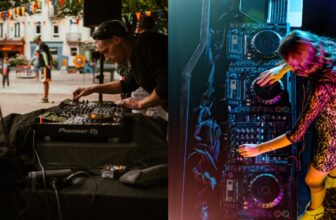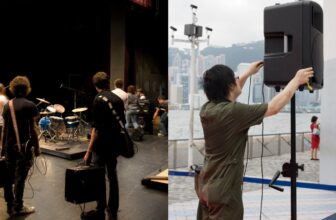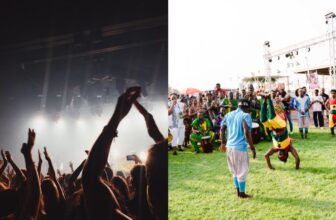7 of the Worst Stereotypes About Musicians

Musicians are frequently subjected to a slew of incorrect stereotypes. It’s not pleasant to be labeled with assumptions about your appearance or profession just because you dress a certain way or engage in a certain activity. Here are seven of the most incorrect stereotypes about musicians.
Like everyone else, musicians are all unique and different in their approach to life and their behavior. However, being a musician still brings with it a variety of misconceptions and assumptions that people hold about you.
Contents
1. Musicians are Always Late

It’s a common misconception that musicians are always late to gigs, and will often flake on social events at the last minute.
The fact is, musicians often need to arrive much earlier than the official performance time to get things set up and ready. Technical checks and run-throughs take time to complete and have to be finished before the actual event itself. And let’s face it – unless you’re an international superstar, if you’re always late to events, you probably wouldn’t be getting jobs to begin with.
For musicians, social events can also be a great chance to network and interact with other people in the industry. Given how important they can be to your career as a musician, it’s safe to say that many musicians are very conscious about being present at events they were invited to.
2. Musicians are Oversensitive
Most songwriters write a variety of songs – happy, sad, emotional, and everything in-between. This can lead to you being stereotyped as oversensitive and easily set off at the slightest provocation.
However, these are emotions that everyone goes through – musicians just have a convenient outlet for them. While other professions may encourage you to either hide your emotions or ignore them completely, musicians have a space to express them and use them as part of their careers. This openness can have positive effects on musicians’ personalities and interpersonal skills.
An Australian study found that musicians were more likely to be open to experiences, sympathetic, and kind than non-musicians. Another study found that playing music helps you pick up and interpret emotional cues in a conversation. So much for being an emotionally unstable, dramatic diva!
3. Musicians are Disorganized

It’s a common assumption – that just because you’re a musician, you’re also disorganized. However, musicians need to be organized to be successful.
If you’re not an established performer, you will need to spend a lot of time self-promoting and networking with people. This involves getting your music out there by emailing people, having a set schedule and method on how to best use social media, and following up on any connections that you have made.
Being organized is an advantage many independently successful musicians cultivate – if you’re able to make a plan and stick to it, more people will want to work with you. Many musicians also have part or full-time jobs while getting started with their music career and being organized is essential when it comes to making sure you manage both successfully.
4. Musicians are Substance Abusers
The 60s and 70s gave us great pop and rock music, as well as several legendary artists. They are also partly the source of the stereotype that all musicians are addicts.
The stories of substance-abusing musicians and rockstars are common. There are many reasons for this belief. One of these is that a lot of “classic” popular music from the mid-1900s centered around drugs. Another is because of how common substance abuse was at the Woodstock music festival, which is in turn an iconic moment in music history. This idea may even have been true once, but that’s not the case today.
Just like everyone else, musicians fall in a spectrum from sober to not. Many musicians are either teetotallers or simply social drinkers. Research shows that musicians do not drink more than non-musicians. Lots of people may assume that these substances are what help drive the creation of music, but being sober can help in making better music. Musicians that are now sober after substance abuse problems have said that being sober can help create music.
5. Musicians are Extrovert, All the Time

A lot of people assume that as a musician, you’re naturally outgoing and extroverted.
Part of being a musician indeed involves interacting with a lot of people. You need to be comfortable with mingling with fans, other musicians, and potential employers. But that doesn’t mean that you always need to be surrounded by people, or that you’re always talkative.
While being able to interact with a wide variety of people is important for any musician’s career, being able to spend time alone can also be beneficial. Research has found that musicians are more accurately ‘bold introverts’ – people who are comfortable in solitude and enjoy having independence. This can be important when it comes to creating music or writing songs, for example.
So, while a level of extroversion is important, not all musicians are extroverted, and those that are, aren’t extroverted all the time.
6. Musicians are Great at Math
This is perhaps the strangest stereotype around musicians. It’s an idea that is all around popular media, with many TV shows referencing the idea of musicians that are also unexpectedly skilled at math. It can lead to parents pushing their children to learn music in the hopes that it helps them get better at math as well, or in the hopes that learning music can help children become smarter in general.
However, mathematician Tim Gowers has said that there is no proof of there being a connection between musical talent and being good at math and that this stereotype has no evidence to back it up.
According to journalist and author Malcolm Gladwell in his book Outliers, what can help someone with math is having persistence and being able to accept frustration. This is also something that can be helpful with music, of course, and thus may be the source of this stereotype.
7. Musicians are Bad with Money

People often consider musicians to be more focused on music, as compared to be general practicalities. This includes stereotyping them as being unable to deal with anything related to business and being bad with money.
There are, of course, broke musicians, just like any other profession. But this is not the norm. Many confuse the term starving artist with a broke artist in a way. Musicians who are not already established need to be able to stay on top of their finances. This often involves having a second job to support your music career, being very conscious about budgeting, or a combination of both.
Music as a career can sometimes involve financial investment from your side – whether to buy instruments and other necessary equipment or to travel for events and gigs. This is not usually possible without being very conscientious about how you spend your money, especially when starting as a musician.
Conclusion
Even though musicians are just as diverse as people in any other profession, there are still a lot of stereotypes about them. These are just some of the ones that we think are the most annoying. How many have been used on you?
Have you ever been stereotyped because you’re a musician? Let us know what assumptions people have made about you, and how you felt about it!





